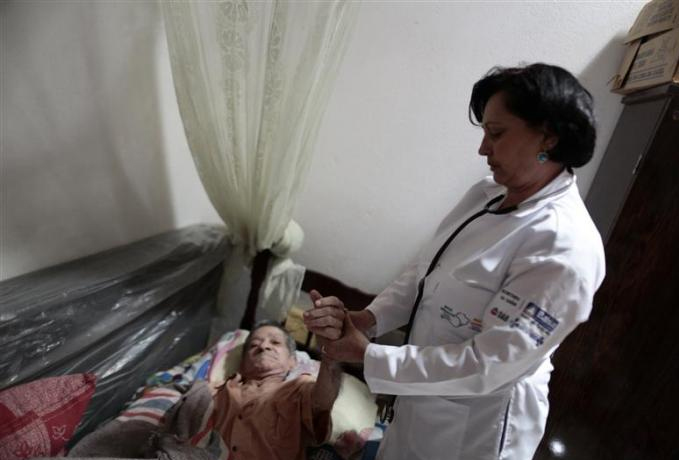 The scandal surrounding the 15,000 Cuban doctors who have been working as virtual slaves in Brazil is growing: Some of them filed a lawsuit in Miami against the Washington-based Pan American Health Organization (PAHO.)
The scandal surrounding the 15,000 Cuban doctors who have been working as virtual slaves in Brazil is growing: Some of them filed a lawsuit in Miami against the Washington-based Pan American Health Organization (PAHO.)
The lawsuit, filed Friday, claims that the regional health organization not only supervised the programme, but pocketed US$75 million of its funds. Meanwhile, the doctors were receiving less than 10 percent of their salaries.
Sam Dubbin, a Miami attorney representing at least four Cuban doctors who defected in Brazil, told me that the lawsuit alleges that PAHO, an agency of the U.N. World Health Organization, supervised and profited from an illegal scheme under which the Cuban doctors had to work in conditions that violate U.S. and international forced labor laws.
Dubbin added that PAHO made US$75 million from supervising the Brazil-Cuba the deal over the past five years.
The programme, known as Mais Medicos, was established in October, 2013, by the left-of-centre government of former Brazilian president Dilma Rousseff. Under the agreement, the Cuban doctors have been working in remote areas of Brazil, where few Brazilian doctors want to live.
Cuba last week announced it was starting to repatriate its doctors from Brazil, after Brazil’s ultra-rightist president-elect, Jair Bolsonaro, denounced the programme as modern-day slavery. Cuba’s export of medical doctors under government programmes in which they are paid a fraction of their salaries has become one of the island’s dictatorship’s top sources of foreign income.
Under the Brazil-Cuba deal supervised by PAHO, Cuban doctors received less than 10 percent of their wages, and the Cuban government kept the bulk of the remainder, the lawsuit against PAHO alleges.
Bolsonaro, who takes office on Jan. 1, had threatened to cancel the Mais Medicos program unless Cuba accepted three conditions: that Cuban physicians recieve their full wages; that their medical degrees be validated by Brazil; and that they be allowed to bring their families. Bolsonaro later tweeted that, “Unfortunately, Cuba has not accepted.”
According to a recent study by the Wharton School at the University of Pennsylvania, there were about 37,000 doctors working in 77 countries in 2015, most of them in Venezuela, Brazil and Central America. Cuba earns an estimated $11 billion a year from this human trade.
Dubbin told me that the plaintiffs filed this lawsuit “because they want to put a stop to this practice of Cuban doctors being treated as slaves.”
He added that they are seeking payment of their full salaries and damages and, “They want to expose an international institution operating right here in the United States that is involved in human trafficking.”
Dr. Ramona Matos, one of the doctors filing the lawsuit, was quoted by Dubbin’s office as saying, “We’re simply asking for the full compensation that we all deserve.”
Dubbin cited several documents, including an audit of the Mais Medicos programme by Brazil’s Supreme Accountability Office, a congressional agency similar to the General Accounting Office in the United States, as showing that over the past five years, Brazil paid about $1.5 billion to PAHO for the programme. Of that money, PAHO paid US$1.3 billion to Cuba, and kept US$75 million for itself. Cuba, in turn, paid the Cuban doctors in Brazil about US$125 million, Dubbin said.
PAHO’s US$75 million income was not used to pay for operating expenses. Those were paid by Brazilian institutions, Dubbin added.
Asked about it, PAHO’sspokesman Luis Felipe Sardenberg said in an email that the funds “are charges levied on all voluntary contributions received by PAHO in order to cover the costs related to management and administration of a programme.” He added that, “All U.N. organizations, as well as nonprofits in general, levy these types of charges.”
But a 2016 PAHO audit shows that the regional organization had already been alerted by its auditors that it faced potential problems with its Mais Medicos deal. The auditors said PAHO needed to set aside some funds to cover claims by Cuban doctors who had already filed lawsuits in Brazilian courts claiming unequal working conditions.
In addition to receiving only a fraction of their salaries, most of the Cuban doctors could not bring their families with them from Cuba, had a daily 6 p.m. curfew and had to report to Cuban intelligence minders.
When I first wrote about the plight of the Cuban doctors in Brazil in September 2013, I called the Cuba-Brazil agreement — and PAHO’s supervision of it — “scandalous.” Now, if it turns out that PAHO also made US$75 million from this deal, we would have a situation in which a U.N. agency has been running a for-profit slave trade business. That wouldn’t just be reprehensible — it would be criminal.










